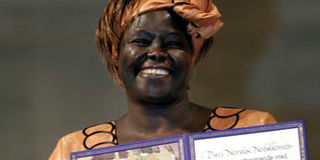Women’s achievements are conveniently ignored

Environmentalist Wangari Maathai poses after receiving the 2004 Nobel Peace Prize at a ceremony on December 10, 2004 in Oslo. PHOTO | COURTESY
What you need to know:
- Women are more likely to hide their successes because society has conditioned them that way, lest they are seen as show-offs.
- Women have so much to offer if they are given a chance to showcase their potential.
When, in 1971, Wangari Maathai received her PhD from the University College of Nairobi (now University of Nairobi), she became the first woman in East and Central Africa to receive a doctorate.
In her book, Unbowed: A Memoir, Prof Maathai says at the time nobody cared about her achievement.
“I was the first woman in East and Central Africa to receive a doctoral degree — a significant achievement that went largely unnoticed.
"It didn’t even make the media headlines, probably because I was not the president, or his daughter, and my husband wasn’t famous. It is funny how such things can be conveniently ignored,” she says.
Prof Maathai’s significant achievement might have been ignored 47 years ago, but I can confidently say things have not yet changed, particularly in this country.
ASSISTANT MINISTER
Actually, I also need to mention that even after Prof Maathai was awarded the Nobel Peace Prize in 2004, it didn’t occur to the administration that she deserved the promotion from an assistant minister to a “full Cabinet minister”.
But then again, since when did we recognise women for their work?
Kenyan women — and women in general — and their achievements are still conveniently ignored by a society that still has a problem with fully embracing high-achieving women.
The reductionist approach with which we still treat women today is not just appalling but quite sad, given how hard women work to get to the top or achieve anything worthwhile.
Women generally work twice as hard to get half of what men have, yet our society has been conditioned to reduce the achievements of women to mere footnotes in history.
PORTFOLIO
We have this philosophy to thank for women downplaying their achievements and keeping quiet about their accomplishments so that they are not seen to be “bragging”, yet we encourage boys from a tender age to speak out about their achievements as we punish girls for the same.
As I was conducting research for a feature story, I stumbled on a TV story about Kenya’s first female architect, Ms Aida Njeri Munano, now the Principal Secretary for Urban Planning and Housing.
I am sure only a few of you know this great woman who opened the door for many other great female architects.
As she was listing her accolades on TV, she stopped midway and said: “I am sounding like I am blowing my own trumpet…” after which she went on to say something else.
Now, when you are in a room full of men, you will not lack one or two egotistical, self-aggrandising ones blowing their own trumpets; listing their accolades and exaggerating their capabilities.
MILESTONE
There will always be that braggart who talks about how company X cannot do without him and his fantastic ideas, and how valued he is in company Y.
Men will rarely allow you to forget their achievements and successful projects (which earned millions, by the way) and if a man happens to be the first-ever person to accomplish something, you will not hear the last of it.
Men will brag about even the simplest of things — such as merely shaking the hand of a great man; they will even mount photos on their office walls, post them on Facebook timelines and use them as their social media profile pictures.
Rarely will a woman brag about her achievements or remind you of her accolades.
Women are more likely to hide their successes because society has conditioned them that way, lest they are seen as show-offs.
SUCCESS
If a woman stands before a crowd and lists her achievements, as she rightly should, chances are that she will be branded arrogant, while the same behaviour is rewarded for men who are branded as simply “confident”.
Success for women becomes like an albatross, which they must carry around their necks, because society shames those who went against the grain to become great and successful.
Let us be honest; we only truly celebrated Prof Maathai when the international community showed some interest in her, otherwise she was just another woman. Right?
Well, I am not asking us to recognise women. Such change of mindset may never happen in my lifetime.
All I am saying is that the constant overlooking of the achievements of women is costing us more than we can imagine.
Women have so much to offer if they are given a chance to showcase their potential.





